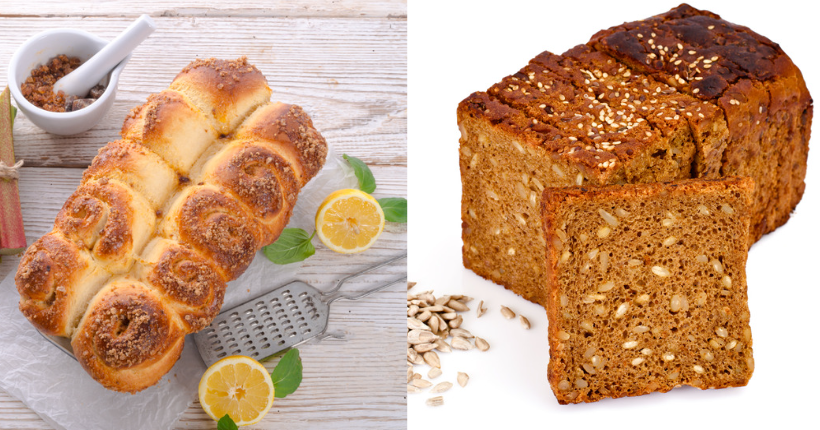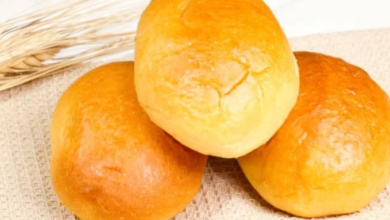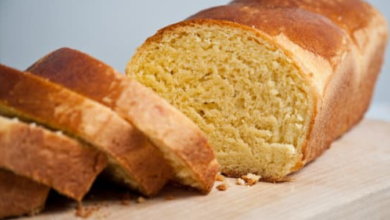Brioche Vs. Whole Wheat Bread: The Whole Story

What To Know
- Its dough is made with a high proportion of butter, eggs, and milk, resulting in a tender crumb that melts in your mouth.
- Whole wheat bread is a good source of fiber, vitamins, and minerals, making it a healthier choice for everyday consumption.
- Whole wheat bread, on the other hand, is more versatile and can be used for a wider range of applications, including sandwiches, toast, and croutons.
In the realm of bread, two titans stand tall: brioche and whole wheat bread. Each boasts a unique flavor, texture, and nutritional profile, igniting a fierce debate among bread enthusiasts. In this blog post, we delve into the depths of brioche vs whole wheat bread, comparing their characteristics, benefits, and drawbacks to help you make an informed choice.
Brioche: The Rich and Buttery French Delight
Originating in France, brioche is a luxurious bread known for its golden-brown crust, soft and fluffy interior, and rich, buttery flavor. Its dough is made with a high proportion of butter, eggs, and milk, resulting in a tender crumb that melts in your mouth. Brioche is often used in pastries and desserts, where its sweetness complements fillings and toppings.
Benefits of Brioche:
- Rich in flavor and texture
- Provides a good source of protein and fat
- Ideal for pastries and desserts
Drawbacks of Brioche:
- High in calories and saturated fat
- Not the best choice for those on a low-fat diet
Whole Wheat Bread: The Fiber-Packed Health Hero
Whole wheat bread is made from the entire grain of wheat, including the bran, germ, and endosperm. This results in a bread that is denser, chewier, and more nutritious than white bread. Whole wheat bread is a good source of fiber, vitamins, and minerals, making it a healthier choice for everyday consumption.
Benefits of Whole Wheat Bread:
- High in fiber, which promotes digestive health
- Rich in vitamins and minerals, including B vitamins, iron, and magnesium
- Can help lower cholesterol levels and reduce the risk of chronic diseases
Drawbacks of Whole Wheat Bread:
- Can be denser and less flavorful than white bread
- May not be suitable for those with gluten sensitivities
Nutritional Comparison: Brioche vs Whole Wheat Bread
| Nutrient | Brioche | Whole Wheat Bread |
| — | — | — |
| Calories | 350-400 | 250-300 |
| Fat | 20-25g | 5-10g |
| Saturated Fat | 10-15g | 1-2g |
| Carbohydrates | 40-45g | 50-55g |
| Fiber | 2-3g | 10-15g |
| Protein | 10-12g | 12-15g |
Taste and Texture: A Matter of Preference
When it comes to taste and texture, brioche and whole wheat bread offer distinct experiences. Brioche is known for its rich, buttery flavor and soft, fluffy texture. Whole wheat bread, on the other hand, has a more earthy, nutty flavor and a denser, chewier texture. Ultimately, the best choice depends on your personal preferences.
Uses and Applications: Versatility vs Specialization
Brioche is primarily used in pastries and desserts due to its sweet, buttery flavor. It is often found in croissants, pain au chocolat, and brioche buns. Whole wheat bread, on the other hand, is more versatile and can be used for a wider range of applications, including sandwiches, toast, and croutons.
Health Considerations: Balancing Indulgence and Nutrition
Brioche is a high-calorie, high-fat bread that should be consumed in moderation. It is not the best choice for those on a low-fat diet or those with heart disease. Whole wheat bread, on the other hand, is a healthier option due to its high fiber content and lower fat content. It is a good choice for those looking to improve their overall health and well-being.
The Bottom Line: A Choice for Every Palate and Purpose
The debate between brioche and whole wheat bread is a matter of personal preference, nutritional needs, and intended use. If you are looking for a rich, indulgent bread for pastries and desserts, brioche is a great choice. If you are looking for a healthier, more versatile bread for everyday consumption, whole wheat bread is the better option. Ultimately, the best bread for you is the one that meets your taste, nutritional, and lifestyle requirements.
Questions We Hear a Lot
1. Which bread has a higher glycemic index?
Brioche has a higher glycemic index (GI) than whole wheat bread, meaning it can cause a more rapid increase in blood sugar levels.
2. Which bread is better for weight loss?
Whole wheat bread is a better choice for weight loss due to its lower calorie and fat content and higher fiber content.
3. Which bread is more filling?
Whole wheat bread is more filling than brioche due to its higher fiber content. Fiber helps to slow down digestion and promote feelings of fullness.
4. Which bread is better for diabetics?
Whole wheat bread is a better choice for diabetics due to its lower GI and higher fiber content. These factors help to regulate blood sugar levels.
5. Which bread is more nutritious?
Whole wheat bread is more nutritious than brioche due to its higher content of fiber, vitamins, and minerals.




